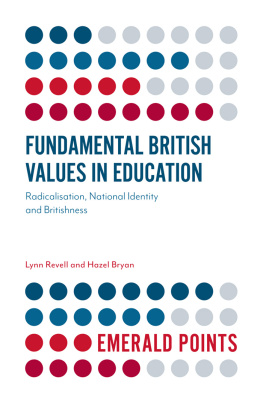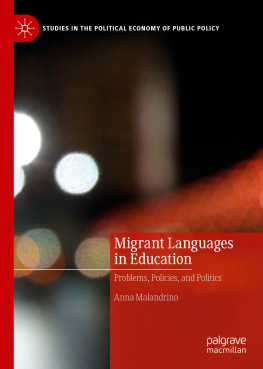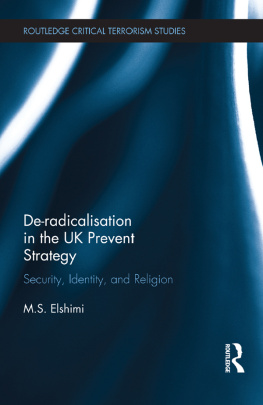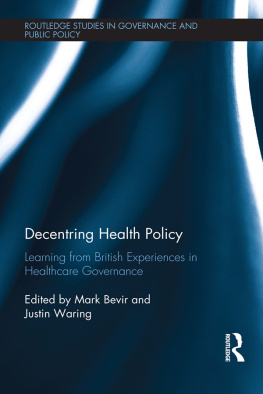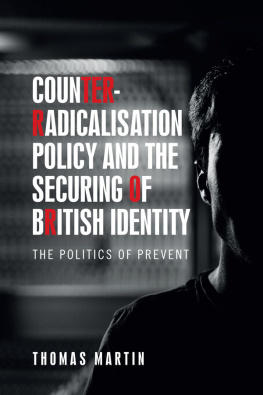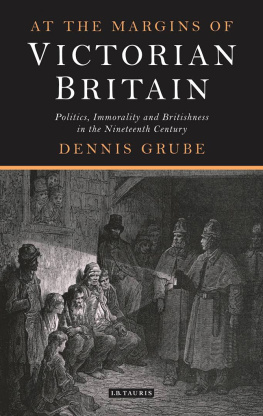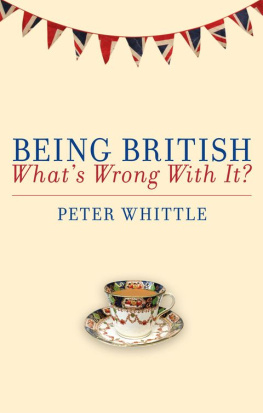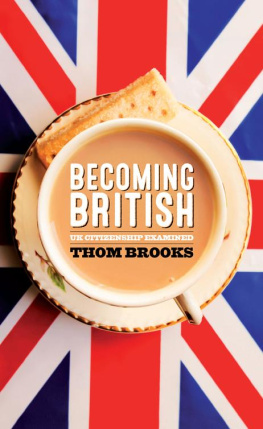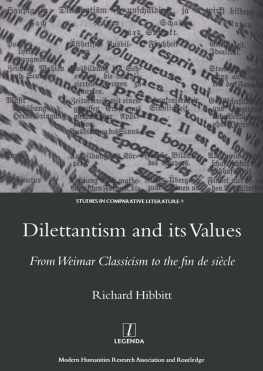FUNDAMENTAL BRITISH VALUES IN EDUCATION
Radicalisation, National Identity and Britishness
FUNDAMENTAL BRITISH VALUES IN EDUCATION
Radicalisation, National Identity and Britishness
By
LYNN REVELL
School of Teacher Education and Development, Canterbury Christ Church University, Canterbury, UK
HAZEL BRYAN
School of Education, University of Gloucestershire, Cheltenham, UK

United Kingdom North America Japan
India Malaysia China
Emerald Publishing Limited
Howard House, Wagon Lane, Bingley BD16 1WA, UK
First edition 2018
Copyright 2018 Emerald Publishing Limited
Reprints and permissions service
Contact:
No part of this book may be reproduced, stored in a retrieval system, transmitted in any form or by any means electronic, mechanical, photocopying, recording or otherwise without either the prior written permission of the publisher or a licence permitting restricted copying issued in the UK by The Copyright Licensing Agency and in the USA by The Copyright Clearance Center. Any opinions expressed in the chapters are those of the authors. Whilst Emerald makes every effort to ensure the quality and accuracy of its content, Emerald makes no representation implied or otherwise, as to the chapters suitability and application and disclaims any warranties, express or implied, to their use.
British Library Cataloguing in Publication Data
A catalogue record for this book is available from the British Library
ISBN: 978-1-78714-508-5 (Print)
ISBN: 978-1-78714-507-8 (Online)
ISBN: 978-1-78714-953-3 (Epub)
To Bertie Townhill and John Revell
CONTENTS
INTRODUCTION
It seems as though the notion of Britishness and national identity have never been addressed with such intensity and seriousness in education as they have in recent years. Education has been used repeatedly as a resource to promote, develop or transmit a sense of nationhood (Lowe, 1999), and in that sense, the requirement to promote a model of Britishness through the curriculum is not unusual. What is new is both the politicised nature of the values associated with Britishness and the security agenda in which schools now operate. In education we have experienced and continue to experience levels of change and impermanence so that constantly changing policies and new initiatives sometimes feel as if they are the only certainty that teachers can rely on. Amidst this perpetual buffeting of flux, a discourse on the role of national values, promoted and cultivated through education, has emerged. All schools now must demonstrate that they promote fundamental British values; they all produce policies and examples of how these values are met through the curriculum and the wider activities and ethos of the school. Organisations that relate to all areas of education unions, professional bodies, resource hubs, dioceses, national associations now routinely produce their own guidance on how their members and users can promote fundamental British values. Two years ago an online search produced no returns for textbooks on fundamental British values, yet now resources and artefacts to be used in lessons are readily available and the list of textbooks and teacher guides is rapidly increasing. The requirement to not undermine or to promote fundamental British values is repeated and regulated through law and policy that relates to education, including the most recent Teachers Standards. Finally, schools will now be inspected in this new area through the Ofsted cycle of inspection.
Two events confirmed the status of fundamental British values as the major factor in the way schools now engage with the issue of national identity and values. The 2014 Trojan Horse affair, where some academy schools in Birmingham were subject to investigation after an anonymous letter to the Department for Education alerted officials to the possibility that governors and teachers were promoting an extremist agenda, signalled the seriousness with which schools were to take their duties in relation to fundamental British values. This marks a turning point in what has come to be termed the securitisation of education (Farrell 2016). Although no school involved was found to have broken the law, the resulting scandal generated widespread fear and confusion about the nature of religious freedom in schools and even the function of public education (Arthur 2015). The second event was the aftershock of the Trojan Horse affair. In 2014 Ofsted carried out 35 no notice inspections and criticised 11 state schools for failing to prepare pupils for life in Britain, placing pupils at risk of marginalisation after failing to provide access to a broad and balanced curriculum and for failing to promote understanding of various faiths or tolerance of communities different to their own. The inspections were carried out in the wake of the Trojan Horse affair and headlines in the press gave the impression that some schools were failing in their duty to promote fundamental British values. The no notice inspections were also a signal to schools that fundamental British values were not only to be taken seriously in schools with Muslim pupils, they were to be addressed rigorously by all schools, Christian or Muslim, academies and community schools alike.
This book aims to examine the significance of fundamental British values in education. It will explore the idea of British values as they appear in contemporary policy and legislation as well as the way Britishness as a concept has evolved in relation to education in the post-war period. The book is organised in two parts. Part One (Chapters 1 and 2) will chart the development of Britishness and British values in the post-war period and show how even in the recent past British values have been understood and executed in policy in relation to schools in very different ways. In the past, Britishness and national identity were either assumed or conveyed through the employment of cultural forms; it is only now that Britishness in education, in the form of fundamental British values, is articulated through explicitly political language. Part Two (Chapters 3 and 4) will examine the impact of fundamental British values on teacher professionalism. It will show how the legislation and policy that structure the way teachers (and other educators) must engage with fundamental British values work to reposition the status of teachers in the public sphere. Teachers work and relationship with the state is recast so that personal, political and individual acts are now situated within the remit of state control and legislation. The concept of Liquid Professionalism is promoted as a form of teacher professionalism for these securitised times.
PART ONE
CHAPTER 1
RADICALISATION AND FUNDAMENTAL BRITISH VALUES
INTRODUCTION
There is no such thing as a set of values that is British; there are only the values that particular governments or policy documents at specific times insist are British. This first chapter charts the way a range of British values in education have been developed and promoted in two separate periods. The first period, from the mid-1990s to the end of the Brown Labour government in 2007, is notable as a time when British values were more likely to be articulated through cultural motifs that referenced a romanticised English past, to a time when British values are now articulated through political ideas that are presented as liberal values. The second period examines Britishness as a form of national identity as it was expressed in education through three key moments: the turn of the 20th century, the 1944 Education Act and the restorationist agenda of the new right from the mid-1980s. The chapter argues that the articulation of Britishness through political concepts is a significant development in the contemporary period and represents a break from past notions of Britishness that were either racialised or took the form of cultural narratives. The chapter begins with an overview of the origins of fundamental British values and the way they are presented in texts, policies and resources in schools.

